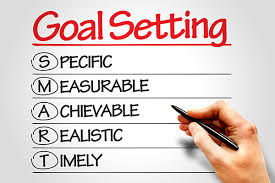 My Dad used to tell me when I was young that if you did not have a Goal then you could not have a plan. In addition, if you did not have a plan then you were just wasting time.
My Dad used to tell me when I was young that if you did not have a Goal then you could not have a plan. In addition, if you did not have a plan then you were just wasting time.
A bit heavy for a 12-year-old but I understand where he was going. Unfortunately we have a tendency to set no goals, we set big goals like what you want to be when you grow up. (You can be whatever you want to be is not always true.) The 5’2” young man who loves basketball, most likely will not play in the NBA.
I was introduced to the concept of SMART goals late in life. It would have been helpful if they had been developed earlier, but as an outline, they are extremely helpful even for an old guy.
SMART is a best practice framework for setting goals. A SMART goal should be:
– Specific –
– Measurable –
– Achievable –
– Realistic –
– Timely –
As a definition, SMART goals are great, but how we employ them is even more important. It is good to have 5, 10 and 15 year goals, but without the monthly or quarterly goals to reach them, they become just a wish or a hope.
You can see why at 12 what-you-want-to-be-when-you-grow-up might be more of a wish or hope than it is a goal.
Long past age twelve and in college, I learned that I was much better suited for using the quarter system than I was at planning for full semesters. Quarters gave you a shorter period and fewer things to accomplish. Generally, you are limited to 8 credit units or less instead of the 15 plus that you could take in a semester.
You had to be creative about your study habits and pacing to get through all of the information in a shorter period, and to get the assignments completed on time. However, you could also see actual progress toward the shorter set of GOALS — especially the idea of being time bound. Ok, maybe some of them were not realistic, like an creating goals for an invertebrate zoology course with no textbook (the professor was writing a new book and did not like any of the available renditions). Shorter period goals can be laced together to create your long-term goals.
In addition, when you set goals for others, without consulting them or getting their “buy in” as part of their SMART goals, you set yourself up for failure. An employee or partner needs to be onboard with you, and you with them, otherwise it is an assignment, not a goal and it is definitely not SMART.
Start with something that you see is achievable in the short term. Give yourself time to get a good plan together. Make a stepped plan to get there using, for instance, a checklist. Publish the plan and get consensus, so everyone buys in. Have a START DATE. Check your progress at regular intervals. If you find you are behind, let everyone know sooner…not later. Don’t be afraid to make adjustments to your plan along the way (not every plan is perfect).
Celebrate your success. Accomplished goals are a reason to pat yourself on the back and those that helped you accomplish them.( Pizza is sometimes the perfect reward.).
You will never be satisfied with your progress if you cannot see how far you have come. SMART goals will help you achieve success.
